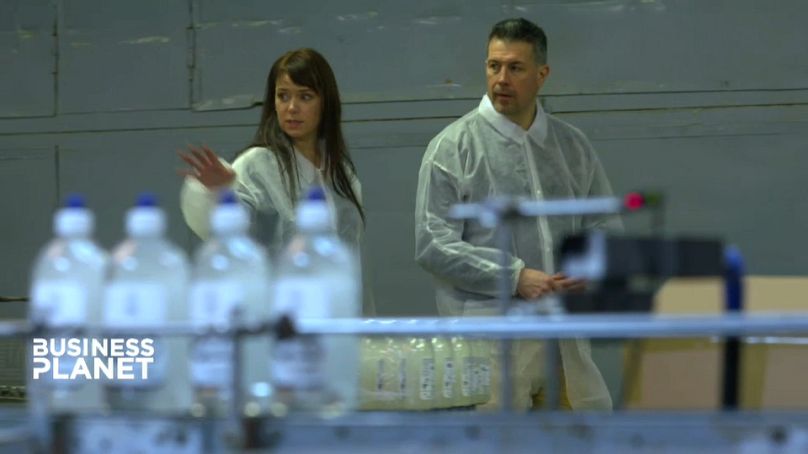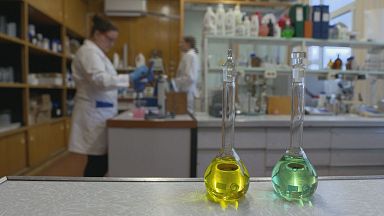Business Planet heads to Latvia to see how the country's biggest household chemical and cosmetics maker is profiting thanks to its eco-minded strategy.
Business Planet heads to Latvia to see how the country's biggest household chemical and cosmetics maker is profiting thanks to its eco-minded strategy.
Chemicals are essential to our daily lives, but some can pose a risk to human health and the environment. Europe's chemical legislation known as REACH places a high responsibility for chemical management on industry. For small firms using substances and mixtures in their production, dealing with such strict requirements can be tough. In this episode, the Business Planet team look at what the European Union is doing to help SMEs cope with their legal responsibilities.
Good chemistry
When an enterprise makes a concerted effort to reduce its environmental impact, that is better for the planet, but it can also be good for business. JSC Spodriba is one such company. Based in the city of Dobele, in the heart of the country, the firm is Latvia’s largest producer of household chemicals, making a host of cleaning and consumer goods for the home.
Since 2012, the company has worked on developing more ecologically friendly products, like its Seal brand range. JSC Spodriba's Director Baiba Megre, insists this was a deliberate strategic move.
"...it was the company’s choice and it fitted very well with the company’s values and philosophy, for a greener future for [the] next generation. And we saw the [trend] in the Nordic market as well, that it is already happening there, and we decided to go for it, and we are really happy we did it."
Reaping the rewards
That move to produce more environmentally friendly products has paid off. The firm’s eco-range now represents nearly 25 per cent of total turnover. But JSC Spodriba is not resting on its laurels. The company has recently obtained new equipment to develop even greener household products through an EU funded project called LIFE/Fit for REACH.
Coordinated by the Baltic Environmental Forum Latvia, the project is designed to help firms in the Baltic region comply with Europe’s stringent chemical rules.
"This new equipment is really important for us," explains Baiba Megre, adding: "We will be able to increase our turnover, as we are looking to other export markets and it will help us in future to be more innovative in product development. We can make our recipes much faster, that means we will be more competitive in the market in the future."
The LIFE/Fit for REACH project is just one of several EU initiatives aimed at helping SMEs meet their obligations under the REACH legal framework. Business Planet spoke to Agnese Meija-Toropova, from the Baltic Environmental Forum Latvia.
Paul Hackett, Business Planet: "Agnese...what kind of support are you offering companies?"
Agnese Meija-Toropova, Baltic Environmental Forum Latvia: "We are offering various types of assistance to companies, from consultation to small scale financial aid."
Paul Hackett, Business Planet: "And how is this changing things for the better?"
Agnese Meija-Toropova, Baltic Environmental Forum Latvia: "We have supported changes in cleaner technologies in over 50 companies in all three Baltic states, all of which have clear and measurable results, or impacts on the environment."
Agnese Meija-Toropova is from the Baltic Environmental Forum Latvia. Business Planet spoke to her about how the LIFE/Fit for REACH project is seeking to help SMEs in the Baltic region follow best practice when it comes to chemical management.
What is the LIFE/Fit for REACH project?
"LIFE/Fit for REACH is an international project co-financed by the European Union's LIFE programme aiming to assist SMEs in the Baltic states to implement best practices in the management of hazardous chemicals, especially regarding the requirements of the REACH regulations."
How is this improving the environment across the Baltic region?
"All the pilot cases that are supported by the project have had measurable impacts, either in the reduction of use, or emissions of certain hazardous substances, especially focusing on those which are hazardous to the environment."
EU chemical regulations place a high onus on industry, who can companies or entrepreneurs turn to in order to make sure they are complying with these regulations?
"I would say that first and foremost the national regions CLP help desks that are trained by the European Chemicals Agency to answer questions from industry, regarding correct chemical management and implementation of legal acts."
Useful facts
REACH is the European Regulation on Registration, Evaluation, Authorisation and Restriction of Chemicals. It entered into force in 2007, replacing the former legislative framework for chemicals in the EU.
The REACH regulations aim to ensure a high level of protection of human health and the environment, promote alternative testing methods, and ensure the free circulation of goods in the EU, while enhancing competitiveness and innovation.
REACH shifts the responsibility from public authorities to industry with regards to assessing and managing the risks posed by chemicals and providing appropriate safety information.
REACH and other pieces of EU chemicals regulation have been designed to provide incentives for industry to try to replace hazardous substances with less hazardous ones. Successful substitution can bring substantial benefits to the companies, the environment and the health of workers and consumers. It can also have a significant positive impact on the implementation of a circular economy.
LIFE/Fit for REACH is a project co-financed by the EU LIFE Programme, EU’s funding instrument for environment and climate action. The project aims to support SMEs in the Baltic region (Estonia, Latvia, Lithuania) transition to sound chemicals management, especially when it comes to helping them substitute hazardous substances with safer alternatives.













